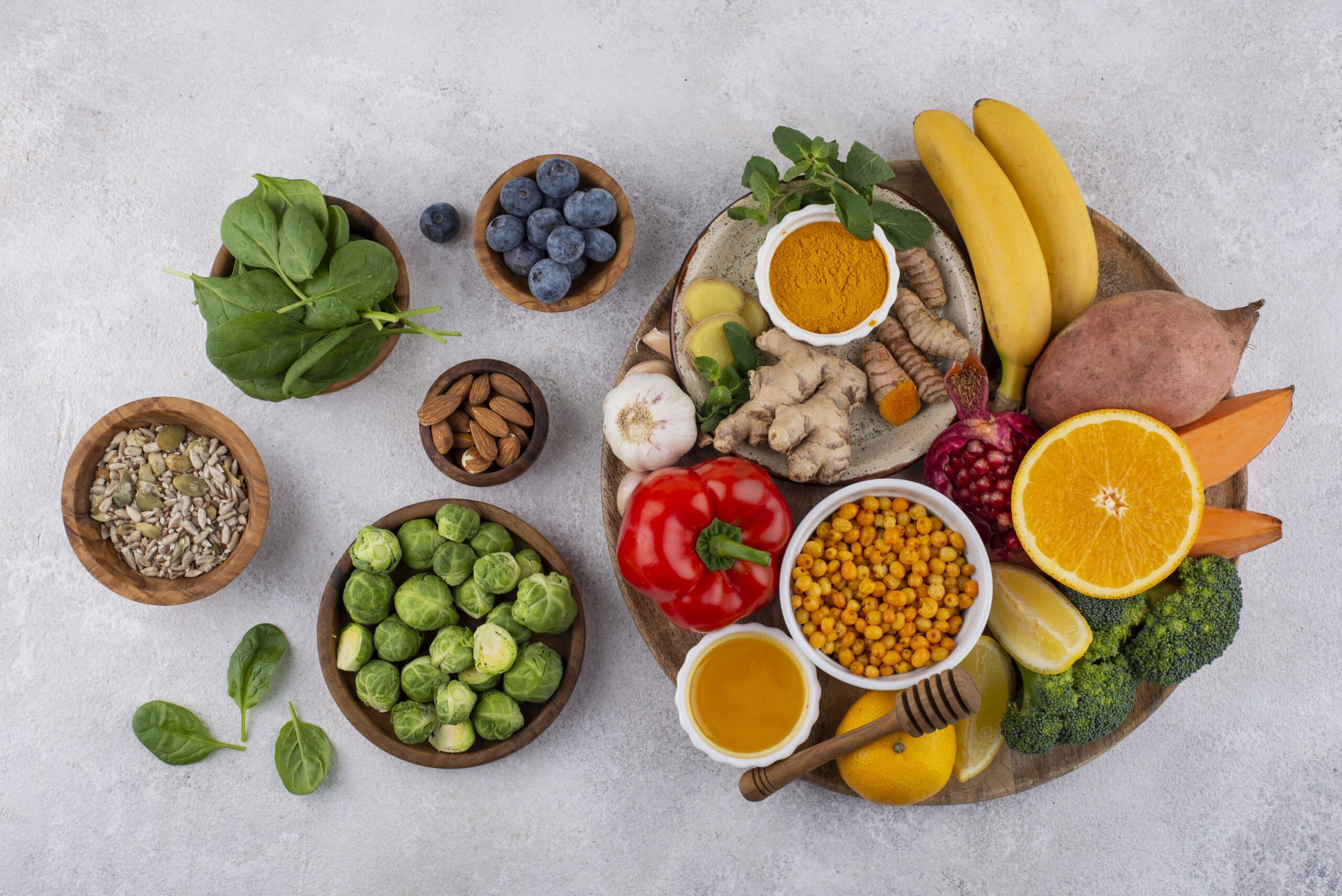Living with an autoimmune disease can feel like fighting an invisible battle every day. But what if the most powerful support for your immune system is already on your plate?
Autoimmune conditions—from rheumatoid arthritis to multiple sclerosis—affect millions worldwide. While medications can help manage symptoms, an emerging body of research supports the anti-inflammatory diet as a powerful tool for healing, resilience, and improved daily living.
What Is an Anti-Inflammatory Diet?
This isn’t a restrictive “diet”—it’s a sustainable, whole-foods lifestyle that:
-
Reduces chronic inflammation, the driver behind many autoimmune flares
-
Supports gut health, home to approximately 70% of the immune system
-
Stabilizes blood sugar and hormones linked to disease activity
-
Boosts cellular energy for resilience and repair
It’s about using food to calm immune overactivity every day.
Autoimmunity & Inflammation: Understanding the Link
Autoimmune disorders occur when a misdirected immune system attacks healthy tissues. Chronic inflammation—fueled by lifestyle and dietary habits—sets the stage. Common triggers include:
-
Highly processed foods, refined sugars, and industrial seed oils
-
Gut imbalances, including “leaky gut” or dysbiosis
-
Blood sugar swings and insulin resistance
-
Environmental toxins, stress, and poor sleep
Shifting toward calming, anti-inflammatory foods often results in fewer flare-ups, better energy, smoother digestion, and mental clarity.
Why Lifestyle influences Genetics
“Our genes are not our destiny… we influence which genes get turned on and off through lifestyle.”
— Dr. Kara Fitzgerald, ND (Practically Healthy, Episode 44, Aug 2023)
This concept—known as epigenetics—is central to her Younger You Protocol. It highlights how diet, movement, and mindset guide biological outcomes beyond inherited DNA.
The Best Anti-Inflammatory Foods to Add to Your Plate
These whole foods are packed with antioxidants, vitamins, minerals, and natural compounds that help lower chronic inflammation, support the gut, and stabilize immune function:
🌿 Vegetables
-
Leafy greens (spinach, kale, arugula, Swiss chard)
-
Cruciferous vegetables (broccoli, cauliflower, Brussels sprouts)
-
Sweet potatoes and carrots (rich in beta-carotene)
-
Beets (contain betalains that fight oxidative stress)
🍓 Fruits
-
Berries (blueberries, raspberries, blackberries, strawberries)
-
Citrus fruits (oranges, lemons, grapefruit)
-
Pomegranate (high in punicalagins and anthocyanins)
-
Cherries and apples (rich in polyphenols and quercetin)
🥑 Healthy Fats
-
Extra virgin olive oil
-
Avocados
-
Nuts and seeds (especially walnuts, chia seeds, flaxseeds)
🐟 Omega-3 Rich Proteins
-
Wild-caught salmon
-
Sardines and mackerel
-
Flaxseeds and chia seeds (plant-based sources)
Anti-Inflammatory Herbs & Spices
These are not just flavorful—they actively reduce inflammatory markers in the body:
-
Turmeric (curcumin is its active compound—best absorbed with black pepper)
-
Ginger (supports digestion and lowers joint pain)
-
Garlic (rich in allicin, which supports immune modulation)
-
Cinnamon (stabilizes blood sugar and reduces inflammation)
-
Rosemary & thyme (contain rosmarinic acid, an antioxidant)
-
Basil, oregano, parsley (especially fresh)
Healing Beverages
-
Green tea and matcha (rich in EGCG antioxidants)
-
Herbal teas (peppermint, ginger, chamomile, rooibos)
-
Lemon water (alkalizing and hydrating)
Foods That Fuel the Fire
Reducing these inflammatory culprits can significantly improve symptoms:
-
Refined sugars and ultra-processed snacks
-
Gluten (especially with Hashimoto’s or celiac)
-
Dairy (when inflammation-sensitive)
-
Industrial seed oils (soy, corn, canola)
-
Alcohol (can irritate gut and disrupt immune function)
Even an 80% reduction in these can mark a big shift in symptom levels.
What the Science Says
Scientific research continues to highlight the power of dietary patterns in managing and potentially preventing autoimmune conditions like rheumatoid arthritis (RA). Here’s what recent studies reveal:
🫒 Mediterranean Diet Reduces Risk of RA
A large-scale, 9-year cohort study analyzing UK Biobank data (117,341 participants) found that high adherence to the Mediterranean diet reduced the risk of developing RA by 29%. These findings were reinforced by a pooled meta-analysis of previous observational studies.
→ Source: Hu P et al., 2025, European Journal of Clinical Nutrition
🍅 Mediterranean Diet Improves RA Symptoms
An earlier randomized controlled trial (RCT) demonstrated that patients with established RA who followed a Mediterranean diet experienced a ~30% improvement in disease activity, along with reduced joint pain and improved physical function after just 12 weeks.
→ Source: Sköldstam L et al., 2003, Annals of the Rheumatic Diseases
🐟 Omega-3 Fatty Acids Lower Inflammation
A 2020 review concluded that omega-3 fatty acids significantly reduce the number of swollen and tender joints in people with RA. They also modulate the immune response, supporting long-term inflammation control.
→ Source: Kostoglou-Athanassiou I et al., 2020, Mediterranean Journal of Rheumatology
🍟 Western Diet Promotes Autoimmune Dysregulation
The modern Western diet—high in refined sugars, omega-6 fats, and processed foods—has been shown to promote chronic inflammation, gut dysfunction, and immune imbalances that increase autoimmune risk.
→ Source: Cordain L et al., 2005, American Journal of Clinical Nutrition
Daily Plate Structure
Start simple:
-
🥗 Half your plate: non-starchy vegetables
-
🍗 Palm-sized protein
-
🥑 Healthy fat: avocado, olive oil, nuts
-
🍇 Small fruit portion: berries or apple
-
🌾 Optional: gluten-free grains (if tolerated)
Tip: Cook at home, use more herbs and spices, and track how your body responds—in energy, mood, digestion.
Beyond Food: Healing Lifestyle Habits
Diet sets the foundation, but consider supporting your system with:
-
7–9 hrs sleep nightly
-
Low-impact exercise: walking, resistance training
-
Stress reduction: deep breathing, meditation, nature
-
Sunlight + vitamin D for immune balance
-
Hydration and herbal teas to support gut flow
Each healthy habit adds to the healing mosaic.
References
-
Dr. Kara Fitzgerald. Practically Healthy Podcast, Episode 44 (Aug 16, 2023)
-
Sköldstam L et al. (2003). Mediterranean diet improves rheumatoid arthritis activity. Ann Rheum Dis.
-
Cordain L et al. (2005). Origins and evolution of Western diet. Am J Clin Nutr. https://pubmed.ncbi.nlm.nih.gov/15699220
** This article is for educational purposes only and is not intended as medical advice. Always consult a qualified healthcare provider before making changes to your diet, medication, or lifestyle.
